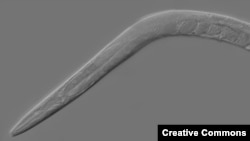The key to beating alcoholism may lie in mutant worms, new research suggests.
By inserting a “modified human alcohol target” into the worms, scientists at the University of Texas in Austin made the worms immune to the intoxicating effects of alcohol.
An alcohol target is a neuronal molecule that binds alcohol.
"This is the first example of altering a human alcohol target to prevent intoxication in an animal," said corresponding author, Jon Pierce-Shimomura, assistant professor in the university's College of Natural Sciences and Waggoner Center for Alcohol and Addiction Research in a statement.
Pierce-Shimomura said the results could lead to new drugs to combat the symptoms of alcohol withdrawal.
The target is a neuronal channel called the BK channel, which regulates the activity of neurons, blood vessels, the respiratory tract and the bladder.
The BK channel “puts the brakes on neural activity,” said Pierce-Shimomura.
However, when a person consumes alcohol, the channel releases more potassium than normal, in effect “slamming the brakes,” he said.
This leads to the sluggish thinking and movement associated with alcohol intoxication.
"We got pretty lucky and found a way to make the channel insensitive to alcohol without affecting its normal function," Pierce-Shimomura said.
The alcohol-insensitive mutation does not disrupt the normal functions of the BK channel.
"Our findings provide exciting evidence that future pharmaceuticals might aim at this portion of the alcohol target to prevent problems in alcohol abuse disorders," says Pierce-Shimomura. "However, it remains to be seen which aspects of these disorders would benefit."
Targeting the effects of alcohol is more tricky than other drugs, like cocaine, which “have a specific target in the nervous system.” Alcohol’s effects on the body are “complex and have many targets across the brain” and include many facets such as tolerance to alcohol, craving and withdrawal, all of which could be influenced by different targets in the brain.
For the study, researchers used a type of worm called Caenorhabditis elegans, which “models intoxication well.” When given alcohol, the worms crawl more slowly and wriggle less from side to side, researchers said.
The limitation of the worms are they are not suited to studying other aspects of alcohol addiction such as cravings. For that researchers plan to use mice, said Pierce-Shimomura.
On a futuristic note, he said the research could one day lead to a “James Bond” drug that would allow a spy, for example, to drink his foe under that table without succumbing to alcohol’s effects. That kind of drug, researchers say could be useful for alcoholics because it could counter the “intoxicating and potentially addicting effects of alcohol.”
The study was published this week in The Journal of Neuroscience.
Mutant Worm Could Help Fight Alcoholism






